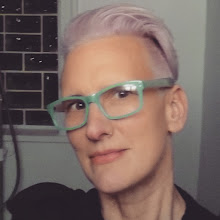In the last few weeks, I've managed to actually read a couple of books, which has always seemed like an impossibility when school is in session. I'm hoping I can maintain the momentum as the semester goes on. We'll see what happens when all the papers start coming in.
See a Little Light by Bob Mould with Michael Azzerad was the first book I read this year. Hüsker Dü has always been one of my favourite hardcore bands, and I was excited to read Mould's (a primary member of the trio) memoir. Hüsker Dü definitely expanded the range of music to be found in the punk scene of the '80s, and the fact that Mould is now an out gay man added another dimension of interest.
One of the great things about the memoir is the look into the band-side of the scene. I know what it was like on my end - the shows, the community, the politics, etc. - but I had no idea what it was like to be in a band at that time. To that end, the memoir did not disappoint.
However, what really annoyed (almost to the point of being infuriated at times) was how the memoir almost totally sidestepped any real self-investigation. Mould constantly does what I call a 'hit-and-run' where he reveals an emotion or anxiety or doubt but never goes beyond simple statements like "I was an asshole" (not a direct quote; have given the book back to its owner). He claims to be laying himself bare but actually constantly avoids any real digging into his motivations, fears, or psychology.
For example, you grow up in a dysfunctional household where your father torments the rest of the family, but you're the golden boy and you don't stop to consider all the ramifications of that? Acknowledging it is only half the battle; understanding its implications on your life and revealing how it affected you is part of what I see as the mandate of memoir/creative nonfiction. I was surprised that he didn't really communicate any feelings of culpability or guilt around this.
He dismisses, mocks, or downright hates his previous bandmates, but we never get a full sense of why. This happens throughout the book. Eight months of therapy was definitely not enough, and I wonder whether the patterns he established in his relationships (both romantic and not) are just going to continue but be explained away with a "that's just how it was." His coming out and exploration of the gay community was interesting and surprising because, while not always queer-positive, the hardcore community in many ways was about being true to who you are in the face of mainstream opposition. While I could go on, these examples highlight some of the main content issues I had.
The other thing that bugged me is that there are constant grammatical issues throughout. Yes, we all make mistakes, but we don't all have editors. Why are we in some past incident, written in the past tense, when suddenly there's a present tense sentence thrown in the middle of that paragraph that's still in the past?! Trying to communicate urgency? There are grammatically correct ways to do that. And yes, I was frequently appalled (yes, appalled) by the comma usage throughout. Sometimes teaching grammar is not a helpful thing.
I'm glad I read it, but I don't know that I understand Bob Mould in a more meaningful way now after reading the book, and that's one thing that I believe memoirs should do.



No comments:
Post a Comment